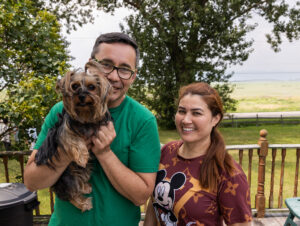A temporary foreign worker at Fraises de l’Île d’Orléans for nine years, Roberto Hernández, originally from Mexico, does not stop for a second: between his demanding job, rigorous personal discipline, and family responsibilities, he still manages to grow his vegetable garden and run 25 km a week.
Translation in English by SIARI
In front of one of the 180 agricultural workers Les Fraises de l’Île d’Orléans hired is a tidy, green vegetable garden overflowing with vegetables. It is the work of Roberto Hernández, a temporary foreign worker of Mexican origin who has been faithful to the position for nine years. The 37-year-old man, who seems tireless, puts much energy into growing zucchini, cucumbers, melons, and tomatillos (which will be used to prepare the famous salsa verde). “This is the first year I have a vegetable garden here, and I love it! » rejoices Roberto.

A well-honed discipline
Ce This orderly garden testifies to the rigor he demonstrates in his job and his personal routine. After six consecutive work days of about 11 or 12 hours each during the harvest season*, he dedicates his day off, Friday, to various activities. On the program, a jog of no less than 25 km in two hours, the cooking of Mexican or Asian dishes, a detour to the grocery store, as well as a call to his wife and sons Samuel, who will soon blow out his three candles and 8-year-old Diego Asael. Above all, don’t forget to go to the local chocolate factory to buy an ice cream. “I have to go eat four-flavor ice cream; otherwise, it’s not a rest day. In truth, I don’t know if it’s a disease, but I’m a sugar fanatic! He says.
He also straddles the house in the tiny house he shares with three colleagues, including his brother. “If the house is clean, it’s easier for us to relax,” he says.
The worker is entitled to a rest period of at least 32 consecutive hours each week. For agricultural workers, the leave can be postponed, once, to the following week if they agree

The long road to Île d’Orléans
Before landing in Île d’Orléans, Roberto had the experience of working in the United States without legal status, as his father had done before. Although his parents hoped their son would pursue a university education after college, he could no longer hold his own. Instead, he wanted to work and build a house for himself and his girlfriend Maria Lorenza – now his wife and the mother of his children. In 2004, he crossed the dangerous border between Mexico and the United States by paying the smugglers $1,400 (an epic that today costs between $8,000 and $10,000) and dodging the border agents.
He then settled for seven years in the neighboring country, far from his family.
Faced with a decrease in labor needs in his sector of activity in 2010, he decided to return home to Irapuato. He worked as a carpenter – a job he still does today when he returns to Mexico, then an opportunity to come and work at Les Fraises de l’Île d’Orléans came to him in 2015. It was the beginning of another great adventure, which was heartbreaking because her first son was to be born the same year.
Since then, he has put his suitcases down every March on this fertile island and takes a flight back to Mexico in November. “I am here to work a lot, help the company, and earn much money. “He misses his family, of course, except that when the season starts, he “changes chips,” he explains, to concentrate on his work.

The importance of a reciprocal relationship
At work, he feels useful and appreciated by his employer, who now entrusts him with tasks such as fertilizing and irrigating production. Since the company is also a research and development center, Roberto often implements new techniques and innovative equipment to improve crops. Relations are good with his superiors and colleagues – who like to tease him and vice versa. However, when something goes wrong, he does not hesitate to speak his mind and is well aware of his rights and responsibilities. “We, as agricultural workers, have the same rights as Quebec workers,” he said, adding that respect must come from both parties. “For me, it is important that the efforts of the hands that make the plants green are recognized because I think it is the least valued work.”

He knows he won’t be idle in Mexico when the season ends. Customers who want furniture made with the Roberto touch are waiting for him, and he also has a hectare of land – given by his father to his son Diego Asael – to maintain.
In 2026, he will have to decide whether to renew his passport or not because it will expire, to return to Quebec as he does every year, or to stay permanently in Mexico. In any case, he will continue to apply what he was taught when he started carpentry: you must create something different from others and continually innovate. Undoubtedly, Roberto will be fine honoring this promise, whether in Mexico, Quebec, or elsewhere.
–
The Government of Canada funded the project.







